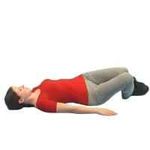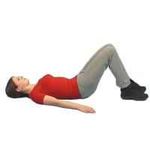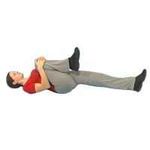Minor Injuries Department Self Treatment of Low Back Pain
←
→
Page content transcription
If your browser does not render page correctly, please read the page content below
Minor Injuries Department
Self Treatment of Low Back Pain
Low back Pain is extremely
common and can affect 4
out of 5 people at some
point in their life. It is
rarely concerning and 98%
of people will fully recover.
Symptoms may include:
• Pain in your lower back which may radiate to your
buttock or leg.
• Tension / spasm in the muscles of your back.
• Altered posture or difficulty moving your back
normally.
• Less commonly: pins and needles, numbness or
weakness in one or both legs.
Be reassured - severe pain doesn’t necessarily indicate a
serious problem. Pain does not always indicate harm or
damage.Recommended treatment for
Low Back Pain:
The following advice can help ease symptoms:
• Pain medication. Speak to your local pharmacist or health
care professional about taking regular medication.
• Heat packs.
• Change position regularly and find a position which helps
relieve symptoms.
• Stay active!
• Return to normal activities as quickly as pain allows.
• Fear can cause a barrier to recovery. Being positive improves
quality of life and can improve outcome!
• Complete the exercises shown regularly throughout the day.
Repeat as many times as you are able.Exercises:
Exercise 1
Rotate your lower back by rolling your
knees to each side, keeping your feet on
the bed.
Exercise 2
Lift your knee towards your chest; use
your hands to stretch as far as you are
able.
Exercise 3
Tilt your pelvis, flattening your
lower back onto the bed.
Exercise 4
Lift your bottom, keeping your
shoulders and feet on the bed.
Exercise 5
In standing, bend to the right and
the left.Advice continued: Keeping active is an essential part of your treatment. It is important to keep your lower back moving whilst you recover to prevent stiffness and help you improve faster. Long periods of inactivity can slow down your recovery. Being physically active throughout your recovery will: • Prevent recurrence of the problem. • Maintain current levels of fitness. • Keep muscles and joints flexible. It is recommended that you stay at work or return as quickly as possible during your recovery. You do not need to be pain or symptom free to return to work. Try to stay positive! Remember, most back pain settles with time! Occasionally low back pain can be a sign of an underlying condition. If your symptoms persist or worsen, despite following the advice in this leaflet, please discuss with your GP or physiotherapist.
Worsening Advice: In extremely rare circumstances low back pain can cause Cauda Equina Syndrome. This would be treated as an emergency and you should attend the Emergency Department as soon as possible. The symptoms are detailed below:
Useful Information and
Contacts:
NHS Forth Valley website has lots of useful information and
contacts:
www.nhsforthvalley.com/health-services/know-who-to-turn-to-when-you-are-ill
GP contact details can be found at www.nhsforthvalley.com/health-
services/local-service-finder/ or by calling NHS 24 on 111.
NHS Inform provides health information and details
of services and support in your area. Call free on
0800 224488 or visit www.nhsinform.co.uk
For people with mental health or psychological problems and in
crisis, support is available by phoning NHS 24 on 111, Samaritans
on 116 123 or Breathing Space on 0800 83 85 87.
The Musculoskeletal (MSK) Helpline is a
service for people experiencing MSK
disorders such as back pain or sports
injuries. Phone 0800 917 9390 (9am to
5pm Mon to Fri). Calls are free.
Call the free national
NHS helpline on 111
Follow us on:
@NHSForthValley NHS Forth ValleyYou can also read


























































